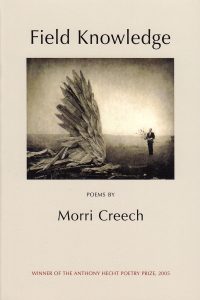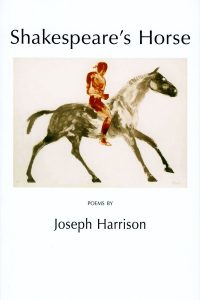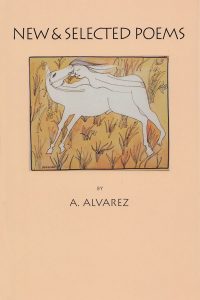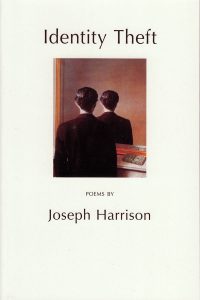Mayflies
£8.95
Expanded UK editionIn 1989 Richard Wilbur published his New and Collected Poems, a landmark volume which won that year’s Pulitzer Prize. Eleven years later, he published the first edition of Mayflies, which gathered together all of the poetry he had written in years following his New and Collected, and added a number of translations, from Mallarmé, Cassian, Petrov, Baudelaire, Molière and Dante. The Waywiser Press’s edition of Mayflies is a significantly expanded volume, which adds eleven new poems to the twenty-five which appeared in the American edition: "The Reader", "Sir David Brewster’s Toy", "Man Running", "Asides", "Tanka", "In Trackless Woods", "Twelve Riddles from Symphosius", "An Eightieth-Birthday Ballade for Anthony Hecht", "To a Comedian", "Blackberries for Amelia", and "Green".
Mayflies
“May the voice of this sure-thinking, clear-sighted poet of uncertainties, with his balanced vision of ineluctable shadow and undiscouraged shining (to borrow Auden’s phrase about Freud), remain with us well into the new century. Wilbur’s work embraces the rich exchange of pleasure and reward that accompanies the writing and receiving of great poetry. In his own words, ‘There’s nothing so wonderful as having constructed something perfectly arbitrary, without any help from anybody else, out of pure delight and self-delight, and then to find out that it turns out to be useful to a few others. You have it both ways, if you’re lucky: you do exactly as you want to do, you’re as lonely and as happy as a child playing with his toy trains, and then it turns out that people are grateful to you …’ Wilbur has been lucky for a very long time; he remains a predominantly lonely, happy poet, for which we, his readers, are increasingly grateful."– Leslie Monsour
"We can only hope that Wilbur is granted another decade, and another book as fine as Mayflies. – Alan Sullivan."
Reviews of Mayflies
Times Literary Supplement
“… Mayflies would be worth reading simply for Wilbur’s fluent translation of Canto XXV of Dante’s Inferno, [but] the book contains, too, a few poems that rank among his best – the austere intensity of ‘Crow’s Nests’, the rhyming tercets of ‘Zea’, the beautiful consolation of ‘For C.’ This last poem, a praise and joyful witness of longstanding love, ends with words that could stand as a fit description of Wilbur’s ouevre: ‘A Passion joined to courtesy and art / Which has the quality of something made, / Like a good fiddle, like the rose’s scent, / Like a rose window or the firmament." – Ian Tromp
Poetry London
“Wilbur has been writing … superb, brilliant, kindly, highly intelligent, deeply literary verse for nearly 60 years … [H]is new collection, Mayflies, is again wonderfully interesting and well-written. The poems are quieter and less showy than in his prime, but the best of them (e.g. ‘For C’, ‘This Pleasing Anxious Being’) still advance urbanely on the reader and then leave one shocked by the sudden emotional power which can be carried by such a civilised vehicle.” – D.M. Black
San Francisco Chronicle
“[Wilbur’s] New and Collected Poems won a Pulitzer Prize (his second) in 1988, leaving some to assume … that it would be the capstone of a long career. Now we have this luminous coda as well … Mayflies is a book to keep, re-read, ponder and memorize.” – Cynthia Haven
The Hudson Review
“Let me end this review by ehorting the reader to acquire a copy of Richard Wilbur’s latest volume, Mayflies. As a critic, I have a hard time framing a response to the book because my reaction is wholly uncritical: I find almost every poem in the book beautiful and wise … [T]his book is a necessary addition to every poetry lover’s library." – Emily Grosholz
Kirkus Reviews
“The graceful combination of virtuoso formal verse and fully matured wisdom produces a tightly woven group of poems and translations that reinforce Wilbur’s standing as one of the great poetic craftsmen of the 20th century.”
The Antioch Review
"Expectedly, the translations (of Mallarmé, Cassian, Petrov, Baudelaire, Molière, and Dante) included in Mayflies are brilliantly crafted. Superb English poems in their own right, those done from the French exhibit a sprightly inventiveness, while conveying nearly all the original meanings." – John Taylor
New York Review of Books
“Readers familiar with the long sweep of Wilbur’s career will hear in Mayflies many echoes, thematic and formal, of what has gone before. But they will also find that the new variations extend and enrich the old Wilbur music … It’s been a long while since I came across a new book of contemporary American poetry which, in its consistency, clarity, and fullness of tone, felt so heartening.” – Brad Leithauser
After the clash of elevator gates
And the long sinking, she emerges where,
A slight thing in the morning’s crosstown glare,
She looks up toward the window where he waits,
Then in a fleeting taxi joins the rest
Of the huge traffic bound forever west.
On such grand scale do lovers say good-bye –
Even this other pair whose high romance
Had only the duration of a dance,
And who, now taking leave with stricken eye,
See each in each a whole new life forgone.
For them, above the darkling clubhouse lawn,
Bright Perseids flash and crumble; while for these
Who part now on the dock, weighed down by grief
And baggage, yet with something like relief,
It takes three thousand miles of knitting seas
To cancel out their crossing, and unmake
The amorous rough and tumble of their wake.
We are denied, my love, their fine tristesse
And bittersweet regrets, and cannot share
The frequent vistas of their large despair,
Where love and all are swept to nothingness;
Still, there’s a certain scope in that long love
Which constant spirits are the keepers of,
And which, though taken to be tame and staid,
Is a wild sostenuto of the heart,
A passion joined to courtesy and art
Which has the quality of something made,
Like a good fiddle, like the rose’s scent,
Like a rose window or the firmament.
Man Running
Whatever he has done
Against our law and peace of mind,
Our mind’s eye looks with pity of a kind
At the scared, stumbling fellow on the run
Who hears a siren scream
As through the thickets we conceive
He ploughs with fending arms, and to deceive
The snuffling dogs now flounders up a stream
Until he doubles back,
Climbing at length a rocky rise
To where he crumples and, exhausted, lies
In the scorched brush beside a railroad track.
*
If then he hops a freight
And clatteringly rides as far
As the next county in a cattle-car,
We feel our sense of him disintegrate
In rumors, warnings, claims
That here or there he has appeared —
Tall, short, fierce, furtive, with or without a beard.
Still, in fidelity to childhood games
And outlaws of romance,
We darkly cheer him, whether or not
He robbed that store, or bank, or fired that shot,
And wish him, guiltily, a sporting chance.
*
Ditching the stolen truck,
He disappears into a vast
Deep-wooded wilderness, and is at last
Beyond the reach of law, and out of luck,
And we are one with him,
Sharing with him that eldest dread
Which, when it gathers in a sleeping head,
Is a place mottled, ominous, and dim
Remembered from the day
When we descended from the trees
Into the shadow of our enemies,
Not lords of nature yet, but naked prey.
The Waywiser Press
Excerpts
For C.
After the clash of elevator gates
And the long sinking, she emerges where,
A slight thing in the morning’s crosstown glare,
She looks up toward the window where he waits,
Then in a fleeting taxi joins the rest
Of the huge traffic bound forever west.
On such grand scale do lovers say good-bye –
Even this other pair whose high romance
Had only the duration of a dance,
And who, now taking leave with stricken eye,
See each in each a whole new life forgone.
For them, above the darkling clubhouse lawn,
Bright Perseids flash and crumble; while for these
Who part now on the dock, weighed down by grief
And baggage, yet with something like relief,
It takes three thousand miles of knitting seas
To cancel out their crossing, and unmake
The amorous rough and tumble of their wake.
We are denied, my love, their fine tristesse
And bittersweet regrets, and cannot share
The frequent vistas of their large despair,
Where love and all are swept to nothingness;
Still, there’s a certain scope in that long love
Which constant spirits are the keepers of,
And which, though taken to be tame and staid,
Is a wild sostenuto of the heart,
A passion joined to courtesy and art
Which has the quality of something made,
Like a good fiddle, like the rose’s scent,
Like a rose window or the firmament.
Man Running
Whatever he has done
Against our law and peace of mind,
Our mind’s eye looks with pity of a kind
At the scared, stumbling fellow on the run
Who hears a siren scream
As through the thickets we conceive
He ploughs with fending arms, and to deceive
The snuffling dogs now flounders up a stream
Until he doubles back,
Climbing at length a rocky rise
To where he crumples and, exhausted, lies
In the scorched brush beside a railroad track.
*
If then he hops a freight
And clatteringly rides as far
As the next county in a cattle-car,
We feel our sense of him disintegrate
In rumors, warnings, claims
That here or there he has appeared --
Tall, short, fierce, furtive, with or without a beard.
Still, in fidelity to childhood games
And outlaws of romance,
We darkly cheer him, whether or not
He robbed that store, or bank, or fired that shot,
And wish him, guiltily, a sporting chance.
*
Ditching the stolen truck,
He disappears into a vast
Deep-wooded wilderness, and is at last
Beyond the reach of law, and out of luck,
And we are one with him,
Sharing with him that eldest dread
Which, when it gathers in a sleeping head,
Is a place mottled, ominous, and dim
Remembered from the day
When we descended from the trees
Into the shadow of our enemies,
Not lords of nature yet, but naked prey.
The Waywiser Press





